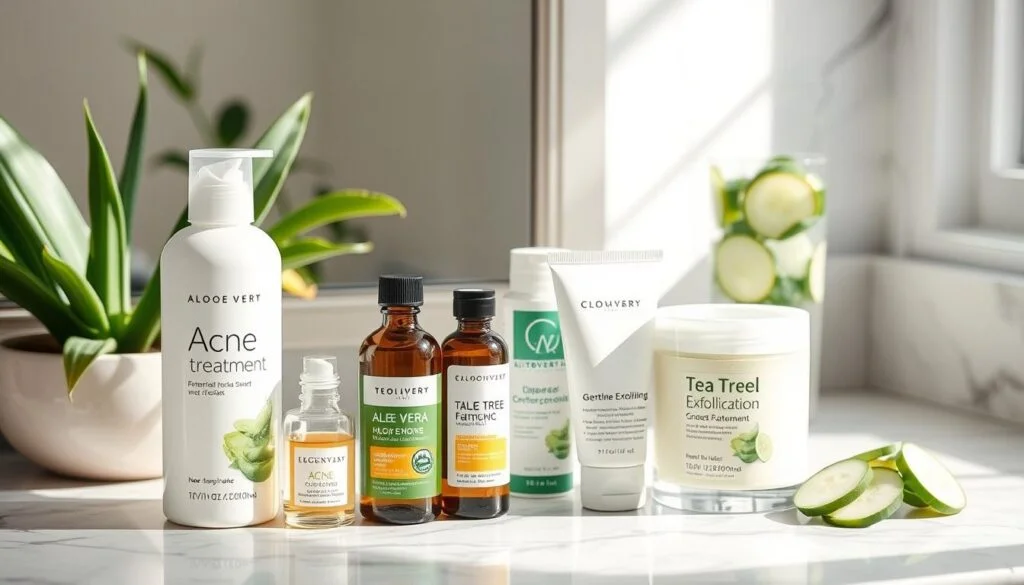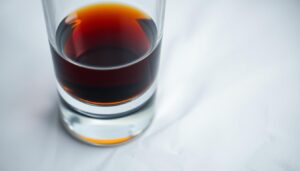7 Tips Better Ways to Remove Acne on Your Face
7 Effective Tips for Clearing Acne on Your Face
Dealing with acne can be really tough and affect your confidence. But, with the right steps, you can manage and clear your face of blemishes. This guide shares seven effective tips to help you get clear, glowing skin.

Key Takeaways
- Understand the root causes of acne, including hormonal influences and environmental factors
- Develop an effective skincare routine tailored to your acne-prone skin
- Explore natural remedies and home treatments to soothe and heal breakouts
- Consult with a dermatologist for professional treatment options and medical solutions
- Adopt lifestyle changes that combat acne, such as managing stress and improving dietary habits
Understanding the Root Causes of Facial Acne
Acne affects millions worldwide and has many causes. It’s important to know the main reasons for facial acne. These include hormonal changes, environmental factors, and what we eat.
Hormonal Influences on Acne Development
Hormonal imbalance is a big reason for acne causes. Changes in hormones, especially androgen, make more sebum. This oil can block pores and cause hormonal acne.
Puberty, menstrual cycles, and hormonal shifts can lead to acne.
Environmental Factors Contributing to Breakouts
Environmental factors also play a part in acne. Pollution, high humidity, and stress can make skin worse. Also, some makeup and products can block pores and make acne worse.
Dietary Impact on Skin Health
Research shows a link between diet and acne. Foods high in refined carbs and processed oils can cause inflammation. This can lead to more acne.
Eating foods rich in antioxidants, healthy fats, and probiotics can help. They support skin health and reduce acne.
Knowing the causes of facial acne helps us fight it. We can take steps to get clearer, healthier skin.
Essential Skincare Routine for Acne-Prone Skin
If you’re fighting acne, a good acne skincare routine is key for clear skin. Using the right acne-fighting products and methods helps manage and prevent breakouts. Here are the must-do steps for your daily cleansing routine.
Cleansing
Start with a gentle, non-drying acne cleanser. It should remove oil, dirt, and impurities without drying out your skin. Choose cleansers with salicylic acid or benzoyl peroxide. These help unclog pores and stop bacteria.
Toning
Next, use a toner to balance your skin’s pH. It gets your skin ready for what’s next. Toners with witch hazel or glycolic acid exfoliate and refine pores.
Treating
Add a acne-fighting treatment to your routine. Use a serum or spot treatment with retinoids, sulfur, or tea tree oil. These ingredients reduce inflammation, dry out blemishes, and prevent future breakouts.
Moisturizing
Even with acne-prone skin, moisturizing is crucial. Use oil-free, non-comedogenic moisturizers that won’t clog pores. Choose hydrating formulas with soothing ingredients like aloe vera or green tea.
Consistency is vital in fighting acne. Stick to this detailed acne skincare routine. You’ll be on your way to a clear, radiant complexion.
Natural Remedies and Home Treatments for Acne
If you’re dealing with acne, there are natural ways to help. Tea tree oil, honey, and turmeric are great alternatives to harsh chemicals. They can clear your skin effectively.
Tea Tree Oil Applications
Tea tree oil is a strong antiseptic that fights acne well. Just apply a bit of undiluted oil to your acne with a cotton swab. It kills bacteria and reduces inflammation. Use it daily for the best results.
Honey and Turmeric Masks
Mixing honey and turmeric makes a strong DIY acne treatment. Combine a tablespoon of honey with a teaspoon of turmeric to make a paste. Apply it to clean skin for 15-20 minutes, then rinse. This mix helps clear pores and blemishes.
Apple Cider Vinegar Solutions
Apple cider vinegar is great for acne too. It balances your skin’s pH, stopping bacteria that cause acne. Mix a tablespoon of vinegar with water, apply with a cotton ball, and rinse after 10-15 minutes. It helps control breakouts and improves skin health.
Using natural remedies like tea tree oil, honey and turmeric masks, and apple cider vinegar can fight acne without harsh chemicals. Try these to find what works best for your skin.
7 Effective Tips for Clearing Acne on Your Face
If you’re dealing with acne, you’re not alone. Millions face this common issue. But, there are ways to clear your skin and feel better about yourself. Here are seven tips to help you:
- Cleanse Gently: Don’t scrub too hard or wash too much. It can make acne worse. Use a gentle cleanser to clean your skin without drying it out.
- Exfoliate Regularly: Exfoliate 1-2 times a week. It helps get rid of dead skin and unclog pores. This makes your skin look clearer.
- Moisturize Wisely: Moisturizing is key, even with acne. Choose oil-free moisturizers that won’t clog pores.
- Spot-Treat Blemishes: Use treatments with salicylic acid or benzoyl peroxide on pimples. But, only on the spots, not all over your face.
- Protect from the Sun: Use sunscreen daily. It prevents damage and dark spots that can make acne look worse.
- Manage Stress: Stress can make acne worse. Try meditation, yoga, or deep breathing to reduce stress.
- Be Patient: Clearing acne takes time. Stick to your routine and be patient. It might take weeks or months to see results.
By following these tips, you can improve your skin’s health and look. Your skin will thank you.

| Tip | Description |
|---|---|
| Gentle Cleansing | Avoid harsh scrubbing and over-washing, which can irritate the skin and worsen breakouts. Instead, use a gentle, non-comedogenic cleanser to remove excess oil, dirt, and impurities without stripping your skin. |
| Regular Exfoliation | Incorporate a gentle exfoliating scrub or chemical exfoliant into your routine 1-2 times per week. This helps unclog pores, slough off dead skin cells, and promote cell turnover for a clearer complexion. |
| Wise Moisturizing | Moisturizing is essential for acne-prone skin. Look for oil-free, non-comedogenic moisturizers that won’t clog pores or contribute to breakouts. |
| Targeted Spot Treatment | Use a targeted spot treatment containing salicylic acid or benzoyl peroxide to help dry out and heal individual pimples. Apply these treatments only to affected areas, not the entire face. |
| Sun Protection | Wear a non-comedogenic, oil-free sunscreen daily to prevent sun damage and hyperpigmentation, which can worsen the appearance of acne. |
| Stress Management | High levels of stress can trigger increased oil production and inflammation, leading to breakouts. Practice stress-reducing activities like meditation, yoga, or deep breathing exercises. |
| Patience and Consistency | Clearing acne takes time and consistency. Stick to your skincare routine and be patient – it can take several weeks or months to see significant improvements in your skin’s clarity. |
Professional Treatment Options and Medical Solutions
When over-the-counter acne products and natural remedies don’t work, it’s time to try professional treatments. These include prescription medications and dermatological procedures. They offer more effective ways to fight stubborn acne.
Prescription Acne Medications
For those with moderate to severe acne, a dermatologist might prescribe medication. This can include:
- Retinoids, such as tretinoin or adapalene, which help unclog pores and reduce inflammation.
- Antibiotics, both topical and oral, that work to kill acne-causing bacteria.
- Hormonal therapies, including birth control pills and anti-androgen medications, which can help regulate hormonal imbalances that contribute to acne.
- Isotretinoin, a potent oral medication that can effectively treat severe, cystic acne.
Prescription acne medications can be very effective. But, it’s important to know about possible side effects. Always work closely with a dermatologist to find the best treatment.
Dermatological Procedures
Dermatologists also offer various procedures for acne. These include:
- Chemical peels, which use acids to exfoliate and unclog pores.
- Laser or light therapy, which can target and destroy acne-causing bacteria.
- Extractions, where a dermatologist manually removes blackheads and whiteheads.
- Steroid injections, which can help reduce the size and inflammation of cystic acne lesions.
These treatments are great for severe, scarring, or treatment-resistant acne.
Over-the-Counter Acne Products
OTC acne products can also help with mild to moderate breakouts. They include:
- Benzoyl peroxide, which helps kill acne-causing bacteria.
- Salicylic acid, which exfoliates and unclogs pores.
- Retinol, a milder form of prescription retinoids that can help unclog pores and reduce inflammation.
- Spot treatments containing ingredients like sulfur or tea tree oil to target individual blemishes.
When using OTC products, always follow the instructions. Start with small amounts to avoid irritation.
Understanding professional treatments and medical solutions helps fight acne. Working with a dermatologist can lead to clearer, healthier skin.
Lifestyle Changes That Combat Acne
Keeping a healthy lifestyle is key in fighting acne. Simple changes can greatly improve your skin’s look and health. Let’s look at some acne lifestyle changes for clearer, healthier skin.
Stress Management
Stress can lead to more acne. Stress management like mindfulness, meditation, or relaxing activities can help. They can balance hormones and reduce inflammation that causes acne.
Sleep and Acne
Good sleep is vital for skin health. Sleep and acne are connected, as bad sleep can harm healing and raise cortisol, worsening acne.
- Try for 7-9 hours of sleep each night to help your skin heal and renew.
- Keep a regular sleep schedule and make your bedtime area calm for better sleep.
Exercise and Acne
Exercise is also good for fighting acne lifestyle changes. It boosts blood flow, removing toxins and bringing nutrients to the skin. It also lowers stress and improves skin health.
- Add different exercises like cardio, strength training, and yoga to your routine.
- Clean your face well after working out to remove sweat and bacteria that can block pores.
By making these lifestyle changes, you can actively manage your acne and get clearer, brighter skin. Remember, being consistent and patient is crucial in fighting acne through lifestyle changes.

Common Mistakes to Avoid in Acne Treatment
Getting clear, blemish-free skin can be tough, especially with common acne treatment mistakes. Many people unknowingly harm their skin with bad skincare habits, choose the wrong products, or live lifestyles that make acne worse. Knowing and avoiding these mistakes can help you manage your skin better.
Harmful Skincare Practices
One big mistake is over-cleansing or using harsh, drying products. While cleaning your skin is key, too much scrubbing and alcohol-based toners can take away natural oils. This can make your skin produce more oil and lead to more breakouts. Also, using hot water or rough exfoliants can irritate and make acne worse.
Product Selection Errors
Choosing the wrong skincare products can also set you back. Using products not made for acne-prone skin or not right for your skin type can clog pores and make breakouts worse. Relying only on over-the-counter meds without expert advice can also be ineffective or even harmful.
Lifestyle Habits to Eliminate
- Neglecting to remove makeup before bedtime
- Touching or picking at blemishes
- Failing to manage stress and anxiety
- Consuming a diet high in processed, sugary, or greasy foods
These common habits can make acne worse and stop you from getting clear, healthy skin. By changing these habits and making better choices, you can manage your acne better and prevent future breakouts.
Remember, fighting acne is a big job that needs a complete approach. By avoiding these mistakes and using a full skincare routine and lifestyle plan, you can control your skin’s health. This will help you get the clear, radiant skin you want.
Prevention Strategies for Long-Term Clear Skin
Keeping your skin clear and healthy is a long-term goal. With the right strategies, you can have radiant skin for years. The key is a consistent skincare routine and tackling the causes of breakouts.
One top way to prevent acne is to adopt a consistent cleansing regimen. Washing your face twice a day with a gentle cleanser removes dirt and oil. This helps prevent clogged pores and blemishes. Also, using exfoliating products a few times a week helps remove dead skin cells and prevents acne buildup.
Managing hormonal imbalances is also key. Hormonal changes can lead to more oil and clogged pores. Lifestyle changes or medical help can address these issues. Stress management, like meditation or yoga, can also help control hormones and reduce acne.
| Acne Prevention Tip | Benefits |
|---|---|
| Consistent Cleansing | Removes excess oil, dirt, and impurities to prevent clogged pores |
| Regular Exfoliation | Sloughs off dead skin cells and prevents buildup that leads to breakouts |
| Hormone Regulation | Addresses the underlying cause of acne-prone skin |
| Stress Management | Helps control hormone levels and minimize acne-triggering stress |
By following these prevention strategies and sticking to a long-term skincare routine, you can manage acne prevention. You’ll achieve clear skin maintenance and enjoy the long-term benefits of long-term skincare.
The Role of Diet and Hydration in Acne Management
Getting clear, radiant skin is more than just a dream. It’s about understanding how diet and hydration affect acne. By choosing the right foods and staying hydrated, you can fight breakouts and get a healthier look.
Foods That Fight Acne
Some foods have special powers to fight acne. Anti-acne foods like leafy greens, berries, salmon, and nuts are full of good stuff. They help reduce inflammation, control oil, and keep your skin healthy. Adding these acne diet foods to your meals can really help your skin.
- Leafy greens (e.g., spinach, kale) – High in vitamins A and C, which support skin cell turnover and reduce inflammation.
- Berries (e.g., blueberries, raspberries) – Packed with antioxidants that combat free radical damage and regulate sebum production.
- Salmon – Rich in omega-3 fatty acids, which have anti-inflammatory properties and can help balance hormones.
- Nuts and seeds (e.g., almonds, walnuts) – Provide essential fatty acids, zinc, and vitamin E, all of which contribute to healthy skin.
Hydration Guidelines
Drinking enough water is key for clear skin. Dehydration can make your skin produce more oil, clog pores, and worsen breakouts. Try to drink at least eight 8-ounce glasses of water a day. Also, eat hydrating fruits and veggies to help your skin.
| Hydration Tip | Benefits |
|---|---|
| Drink sufficient water | Flushes out toxins, keeps skin supple, and regulates oil production |
| Consume water-rich foods | Cucumbers, watermelon, and citrus fruits provide additional hydration |
| Limit caffeine and alcohol | These can be dehydrating and disrupt the skin’s natural balance |
By choosing the right foods and staying hydrated, you can improve your skin. These simple tips can make a big difference in fighting acne.
Conclusion
Clearing acne and getting healthy skin is a journey that needs a few steps. First, understand what causes acne, like hormones and diet. Then, take action to fix these problems.
Creating a good skincare routine is key for acne-prone skin. Use products that clean and nourish. Adding natural remedies like tea tree oil, honey, and apple cider vinegar can help too. This supports your clear skin journey.
Every person’s skin is different, so there’s no single way to treat acne. Sometimes, you might need professional help or medical treatments. Always talk to your dermatologist to find what works best for you. By making smart lifestyle choices and avoiding common mistakes, you can achieve skincare success. This brings confidence and radiant skin.
FAQ
What are the main causes of facial acne?
Facial acne can come from many sources. Hormonal changes, pollution, and certain foods are big factors. These can lead to breakouts.
What is the essential skincare routine for acne-prone skin?
For acne-prone skin, start with gentle cleansing and toning. Use products that fight acne without clogging pores. Moisturize well and add treatments like benzoyl peroxide or salicylic acid.
What are some natural remedies and home treatments for acne?
Natural treatments include tea tree oil, honey and turmeric masks, and apple cider vinegar. These have antibacterial and anti-inflammatory effects, helping to fight acne and heal the skin.
What are the most effective tips for clearing acne on the face?
To clear acne, keep a consistent skincare routine. Use products that don’t clog pores and include acne-fighting ingredients. Manage stress, sleep well, stay hydrated, and avoid picking pimples.
What are the professional treatment options and medical solutions for acne?
Professional treatments include prescription meds and dermatological procedures. Topical retinoids, oral antibiotics, chemical peels, laser treatments, and extractions are options. Over-the-counter products with benzoyl peroxide or salicylic acid can also work.
What lifestyle changes can help combat acne?
To fight acne, manage stress, sleep well, exercise regularly, and eat right. Stress control, enough sleep, and a balanced diet help clear your skin.
What are the common mistakes to avoid in acne treatment?
Avoid harsh skincare, the wrong products, and unhealthy habits. Overexfoliating, using drying products, and ignoring acne causes can make it worse.
What are the prevention strategies for maintaining long-term clear skin?
For clear skin, stick to a skincare routine, use acne-fighting ingredients, and tackle acne causes. A holistic approach with skincare, lifestyle changes, and professional treatments prevents acne.
How do diet and hydration impact acne management?
Diet and hydration are key in managing acne. Avoid foods high in refined carbs and eat a balanced diet. Stay hydrated to fight breakouts. Anti-inflammatory foods and enough water are crucial for healthy skin.






Post Comment